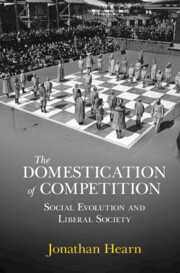Book contents
1 - The Context of the Question
from Part I - The Ideas
Published online by Cambridge University Press: 26 January 2023
Summary
Chapter 1 examines three main historical processes that have framed and provoked my interest in questions of competition. First, the classic problem that has come to be known as ‘the rise of the West’. What caused the rise to global power of Western Europe and its settler societies in the last few centuries? I suggest the domestication of competition must be part of the answer. Second, the domestication of competition is associated with the rise of a particular kind of nation state, the currently dominant model of capitalist liberal democracy. Why is this? And third, does what has come to be known as ‘neoliberalism’ have a special role to play in explaining the current state of competition? One often encounters this idea in critical discussions of neoliberalism, but my argument suggests that the pervasive role of competition in modern society has historically deeper roots, whatever its current transformations.
Keywords
- Type
- Chapter
- Information
- The Domestication of CompetitionSocial Evolution and Liberal Society, pp. 21 - 46Publisher: Cambridge University PressPrint publication year: 2023



